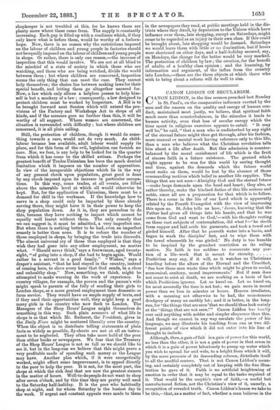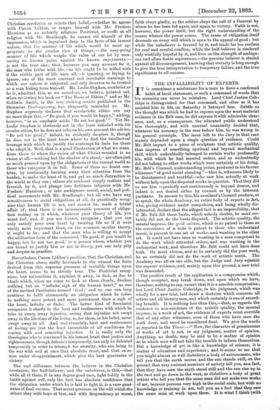CANON LIDDON ON SECULARISM.
CANON LIDDON, in the fine sermon preached last Sunday in St. Paul's, on the comparative influence exerted by the seen and the unseen on the quality and energy of human con- duct, maintained most justly, we believe, that spiritual faith much more than counterbalances, in the stimulus it lends to human activity, even that loss of secular energy which the time spent in religious exercises appears to entail. " It may well be," he said, "that a man who is undisturbed by any sight of the eternal future might thus get through, after his fashion, more manual or mental work having reference only to this life, than a man who believes what the Christian revelation tells him about a life after death. But this admission is counter- balanced by the moral enrichment of life which is the fruit of sincere faith in a future existence. The ground which might appear to be won for this world by saving thought and time, against the demands which the future world must make on them, would be lost by the absence of those commanding motives which belief in another life supplies. The things that are not seen—Almighty God and the eternal future —make large demands upon the head and heart; they also, or rather thereby, make the kindred duties of this life serious and noble, since all are a preparation for that which is to follow. There is a scene in the life of our Lord which is apparently related by the Fourth Evangelist with the view of impressing this upon us. St. John tells us how, Jesus, knowing that the Father had given all things into his hands, and that he was come from God and went to God,'—with his thoughts resting on these vast subjects of contemplation, did what P—' he riseth from supper and laid aside his garments, and took a towel and girded himself. After that he poureth water into a basin, and began to wash the disciples' feet, and to wipe them with the towel wherewith he was girded.' No duty is too humble to be inspired by the grandest conviction as its ruling motive. No faith is too sublime to consecrate any por- tion of a life, work that is meant for eternity Positivism may say, if it will, as it watches us Christians kneeling before the altars of the Eternal and the Crucified, See how these men waste time which might be given to social, economical, sanitary, moral improvements.' But if man does not cease to exist at death, we are working on a basis of fact which Positivism ignores. Let us kneel on. Let us kneel on, for most assuredly the time is not lost; we gain more in moral power than we lose in minutes or hours. Heaven irradiates, with a meaning not otherwise to be had, the monotonous drudgery of many an earthly lot; and it is better, in the long- run, for the things that are seen 'that we should thus look mainly at the things that are not seen." Canon Liddon has hardly ever said anything with nobler and simpler eloquence than this. And though we cannot in any way emulate the power of his language, we may illustrate his teaching from one or two dif- ferent points of view which it did not enter into his line of thought to include.
Although, then, a gain of fait is a gain of power for this world, no less than the other, it is 'not a gain of power in that sense in which it is a gain of power laboriously to pump up water which you wish to spread far and wide, to a height from which it will, by the mere pressure of its descending column, distribute itself to all the needful centres. That is not Canon Liddon'e mean- ing, and certainly completely out of keeping with the fine illus- tration he gave of it. Faith is no artificial heightening of emotion in order that it may be equal to the tasks required of it. That would be the sceptic's view of faith,—a useful but manufactured fiction, not the Christian's view of it, namely, a recognition of revealed truth. Canon Liddon's lesson we take to be this,—that, as a matter of fact, whether a man believes in the Christian revelation or rejects that belief, —whether he agrees with Canon Liddon, or ranges himself with Mr. Frederic Harrison as an ardently religions Positivist, or scoffs at all religion with Mr. Bradlangh, he cannot rid himself of the impression, which is ingrained deep in the facts of his inmost nature, that the manner of life which would be most ap- propriate to the secular view of things, — the easy-going manner of life which weighs the value of our lot by mea- suring its known pains against its known enjoyments,— is not the true one; that, however you may account for it, the man who trifles with life,—as life ought to be trifled with if the visible part of life were all,—is ignoring, or trying to ignore, one of the most constant and inevitable warnings to which our nature is subjected, and only deserves to be treated as a man hiding from himself. Mr. Leslie Stephen, secularist as he is, admitted this, as we ourselves, we believe, pointed out, when reviewing his book on "The Basis of Ethics ;" and as Mr. Goldwin Smith, in the very striking article published in the December Contemporary, has eloquently reminded us. Mr. Stephen expressly declares that secularistic ethics can say no more than this,—" Be good, if you would be happy," adding, however, "in an emphatic aside, Be not too good.'" Yet Mr. Leslie Stephen is obviously not in the least satisfied with his secular ethics, for he does not echo on his own account the advice, "Be not too good ;" indeed, he evidently despises it, though he .does not in the least know where to find the intellectual leverage with which to justify the contempt he feels for those who adopt it. Well, that is a good illustration of what we mean. Even those to whom the vision of what Christ revealea in no 'vision at all,—nothing but the shadow of a cloud,—are oftenjnst as much pressed upon by the obligations of the eternal world as those who recognise it in full. Some of them no doubt con- trive, by continually turning away their attention from the burden, to make the least of it, and get as much distraction in the world as they can ; others are rendered simply restless and feverish by it, and plunge into fictitious religions with Mr. Frederic Harrison ; or into ambiguous moral, social, and poli- tical movements with Mr. Bradlaugh ; but all who have any .sensitiveness to social obligations at all, do practically recog- nise that human life is not, and cannot be, made a trivial affair of; that there is an immeasurable pressure of obliga- tion resting on it which, whatever your theory of life, you must fee], and, if you are honest, recognise ; that you can only satisfy your own heart by treating life as if it were vastly more important than, on the common secular theory, it ought to be ; and that the man who is willing to accept the utilitarian form of the command, Be good, if you would be happy, but be not too good,' is a person whom, whether you are bound to justify him or not in theory, you can only pity and despise in practice.
Nevertheless, Canon Liddon's position, that the Christian, and the Christian alone, really husbands to the utmost the force derived from this supreme pressure of invisible things upon the heart, seems to us strictly true. The Positivist recog- nises, but rationalises it, explains it away, in fact, as due to ideals which, when we come to look at them closely, disclose nothing but an "infinite sigh of the human heart," as one of the earliest Pantheists termed ' God ;' and no one can long continue to fulfil strenuously an obligation which he refers to nothing more potent and more permanent than a sigh of the heart, infinite or finite. The better kind of Secularist recognises it chiefly in the heat and restlessness with which he tries to sweep away injustice, seeing that injustice not swept away in the life-time of the living, is, for them, in his belief, never swept away at all. And unfortunately, heat and restlessness of feeling are just the least favourable of all conditions for coping with and removing injustice. It is really only the theologian who is convinced iu his inmost heart that justice and righteousness, though defeated temporarily, can only be defeated temporarily in order to triumph for eternity, who can bring to the war with evil at once that absolute trust, and that cam- flees under disappointment, which give the best guarantee of victory.
The real difference between the believer in the Christian revelation, the half-believer, and the unbeliever, is this,—that while all of them, if in any degree good men, fight boldly in the battle against evil, only the first has absolute confidence that the obligation under which he is laid to fight it, is a sure guar- antee of final success. That secret pressure on the will which the others obey with hope at best, and with despondency at worst,
faith obeys gladly, as the soldier-obeys the call of a General by whom he has been led again and again to victory. Faith is not, however, the power itself, but the right understanding of the source whence the power comes. The sense of obligation itself descends on every will which is open to the appeal of good ; but while the unbeliever is fevered by it, and made far too -restless for cool and careful conflicts; while the half-believer is rendered only wistfully hopeful by it, and lives on the strength of ambigu- ous and often feeble aspirations,—the genuine believer is steeled against all discouragement, knowing that eternity is long enough to give the true interpretation to temporary failure, and the true significance to all success.







































 Previous page
Previous page